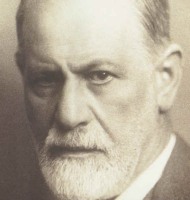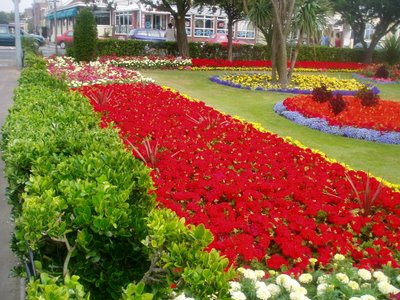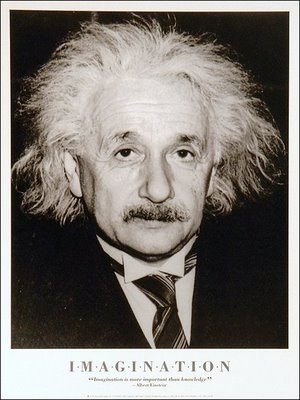31 July, 2006
Tower Bridge was opened in 1894 after an Act of Parliament decreed that a river crossing should be built to enable those living in east London to cross the river without having to go upstream to London Bridge. The Act also stated that pedestrians should be able to cross at all times, so an overhead walkway 143 feet above the water was constructed but it had to be closed because of the high incidence of suicide from the bridge.
There is a story that when Lake Havasu City in Arizona purchased the old London Bridge they thought they were buying Tower Bridge. (I will post about that interesting story on another occasion).
The bridge was constructed by building a massive steel frame and dressing it with Cornish granite and Portland stone so that it's appearance matched the nearby Tower of London. Each of the bascules (the part that raises) weighs 1,200 tons and is still raised by the original hydraulic system. It is now powered by oil and electricity but until 1976 it was still steam-powered.
The bridge is synonomous with London and it's iconic status ensures world wide renown. It is still a magnificent sight and a tribute to Victorian engineering skills and civic pride.
28 July, 2006
My Heroes: (5) Sigmund Freud
Most of the photographs that I have seen of Sigmund Freud show him looking straight back at the camera in a defiant manner. He was always confident of his theories and vigourously defended his findings. Although he was a ground-breaking pioneer many of his ideas have been superceded and challenged but that is often the fate of an original thinker. When he published The Interpretation of Dreams in 1900 he introduced the concept of the unconscious mind to the public and The Psychopathology of Everyday Life in 1901 dealt with the theory that nothing one said was an 'accident' but the result of the activity of the 'dynamic unconscious'; that is what we now refer to as a 'Freudian Slip'.
He went on to shock the world with his ideas on how the sex drive was the primary motivational force in mankind (and, later, womankind) eg. the Oedipus Complex. Whatever one thinks of his work now, and there are plenty of detractors, I admire the way he confidently published absolutely revolutionary ideas and generated a leap forward in understanding ourselves that others have taken forward and refined.
25 July, 2006
Hermitage Marina, Earith, England
I took this picture of this delightful little marina in Cambridgeshire last week. It's very small but exceptionally picturesque. Apparently it's for sale if you're interested! It's located at the confluence of three rivers in the middle section of the Great Ouse Navigation System.
24 July, 2006
Diss, Norfolk, England
 This Vespa was being photographed at Diss in Norfolk for 'Scootering' magazine. It is a direct decendant of the machine featured in the film 'Quadrophenia' in 1979. The original model was very popular in the 50's in Italy. This one is owned by a man from Lexham Insurance who, apparently, specialize in Scooter and other two wheel insurance. (I have no connection with that company. Just thought I'd give a friendly guy a plug). The ornamental lake in the backgound is rather nice and right in the middle of the High Street in Diss, a very lovely town.
This Vespa was being photographed at Diss in Norfolk for 'Scootering' magazine. It is a direct decendant of the machine featured in the film 'Quadrophenia' in 1979. The original model was very popular in the 50's in Italy. This one is owned by a man from Lexham Insurance who, apparently, specialize in Scooter and other two wheel insurance. (I have no connection with that company. Just thought I'd give a friendly guy a plug). The ornamental lake in the backgound is rather nice and right in the middle of the High Street in Diss, a very lovely town.20 July, 2006
Hammersmith Bridge, London
 I took this picture earlier this week crossing Hammersmith Bridge over the River Thames in London. The current Bridge was opened in 1877 using the concrete bases from the original bridge which was opened in 1827. It cost £82,117 to build. In 1870 over 11,000 people crowded on to the bridge to watch the university boat race between Oxford & Cambridge which alarmed the government who then commisioned the present bridge. It was damaged by a terrorist bomb in 2000 and was seriously weakened and consequently now has a weight restriction but the red double-decker buses can still use it. When it is lit up at night it is beautiful to see. If you would like to learn more click here.
I took this picture earlier this week crossing Hammersmith Bridge over the River Thames in London. The current Bridge was opened in 1877 using the concrete bases from the original bridge which was opened in 1827. It cost £82,117 to build. In 1870 over 11,000 people crowded on to the bridge to watch the university boat race between Oxford & Cambridge which alarmed the government who then commisioned the present bridge. It was damaged by a terrorist bomb in 2000 and was seriously weakened and consequently now has a weight restriction but the red double-decker buses can still use it. When it is lit up at night it is beautiful to see. If you would like to learn more click here.Clacton-on-Sea, east coast of England
I saw these communal flower gardens today in Clacton-on-Sea in Essex on the east coast of England. The intensity of colour that you see is not enhanced, that is exactly how they look. They are striking in appearance and so brilliantly coloured that I could not take my eyes off them for a good while. Fortunately I had thirty minutes to kill before a business appointment.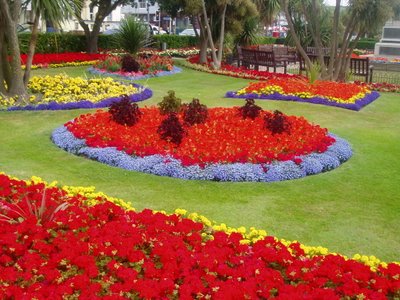

If I could not avert my gaze from these flowers imagine
14 July, 2006
My Heroes: (4) Albert Einstein
Look at that fabulous photograph! It looks like an archetypical image of a genius who couldn't tie his own shoe laces; hairstyle courtesy of Van De Graaff Generator . A female aquaintance told me that I should not admire Albert Einstein because "he was unkind to the woman in his life". I don't know if that is true or not. It is certainly hinted at in various places but it poses an interesting question: Whom should we admire? Are there criteria?
I believe a person should be regarded on the quality of their merits because none of us are perfect. Should the acheivments of Churchill be negated because of his drinking habits? Or should Isaac Newton not be recognised for his 'genius' because of his caustic personality? Anyway, I digress. Back to Einstein.
The qualities that impress me most are twofold. Firstly he had the most amazing imagination ("Imagination is more important than knowledge" he once said). At the age of 16 he had tried to imagine what it would be like to ride on a beam of light. That was ten years before he published the Special Theory of Relativity.
Secondly I admire his humility. He thought of his work merely as a step toward the next big advance. He is quoted as saying: "When I am judging a theory, I ask myself whether, if I were God, I would have arranged the world in such a way."
I believe a person should be regarded on the quality of their merits because none of us are perfect. Should the acheivments of Churchill be negated because of his drinking habits? Or should Isaac Newton not be recognised for his 'genius' because of his caustic personality? Anyway, I digress. Back to Einstein.
The qualities that impress me most are twofold. Firstly he had the most amazing imagination ("Imagination is more important than knowledge" he once said). At the age of 16 he had tried to imagine what it would be like to ride on a beam of light. That was ten years before he published the Special Theory of Relativity.
Secondly I admire his humility. He thought of his work merely as a step toward the next big advance. He is quoted as saying: "When I am judging a theory, I ask myself whether, if I were God, I would have arranged the world in such a way."
Graduation Day
The twins, age three-and-a-half, were watched by both sets of grandparents as they received their 'prizes' at their graduation. All of the children marched in wearing mortar boards and gowns for the ceremony and looked very cute if a little bewildered. There was a Shabbat (Jewish Sabbath) table laid out and all the little girls lit candles and said the proper prayers and the boys 'broke bread' and said the appropriate prayers for that.
In September they will start the mornings-only reception class at their first proper school. They will be three and three quarters which seems, to me, to be very young. At that age the state pays for pre-school education in the UK.
 After the ceremony they were joined by their young cousin, Sonny, who idolises them which they just about tolerate. Of course, they being very nearly completely grown-up, he seems to be just a baby to them! I just love them all so much it hurts!
After the ceremony they were joined by their young cousin, Sonny, who idolises them which they just about tolerate. Of course, they being very nearly completely grown-up, he seems to be just a baby to them! I just love them all so much it hurts!09 July, 2006
Carvoeiro, Portugal
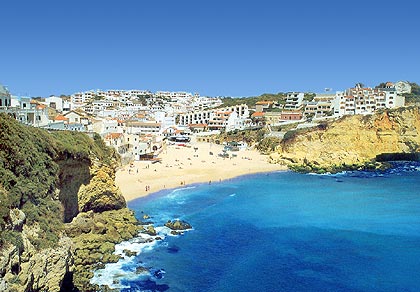 We returned on Friday from nine days at a villa in Carvoeiro in the Algarve, southern Portugal. It was a great chill-out holiday spent mostly reading by the pool. The villa has a stock of around 200 paperbacks that were left by previous guests. The book I enjoyed most was the wonderful novel by Marina Lewycka called A Short History of Tractors in Ukranian.
We returned on Friday from nine days at a villa in Carvoeiro in the Algarve, southern Portugal. It was a great chill-out holiday spent mostly reading by the pool. The villa has a stock of around 200 paperbacks that were left by previous guests. The book I enjoyed most was the wonderful novel by Marina Lewycka called A Short History of Tractors in Ukranian.The narrator and her sister, who have never got along, have to join forces to save their 84 year-old father from the clutches of a 36 year-old Ukranian gold-digger, whose huge enhanced breasts have mesmerised the old man.
The story is, by turns, comic, moving, tragic and revealing. What is revealed, to the narrator, is the war-time family secrets from which she has been sheilded.
A Short History of Tractors in Ukranian is, in fact, the title of a book within the novel that her father is writing.
I was trying to think of other novels where the title of the book was also the title of a work within the fiction; there are probably lots of them. The Hitchhiker's Guide to the Galaxy is one - please let me know of any others you can think of.
The lovely cool lounge of Casa das Palmeiras, where we stayed.
I also enjoyed reading a book by Simon Kuper clumsily titled Ajax, the Dutch, the War: Football in Europe During the Second World War. The fascinating subject, superficially, is soccer in Europe during the war years but the underlying themes that I found of real interest was Dutch resistance to the Nazis (or lack of it), anti-semitism, Nazi propoganda and the way Ajax was percieved as a 'Jewish' club. I found the book a little disconnected in the way it jumped from one topic to another with no obvious connection but it was, overall, an enjoyable read.
My Heroes: (3) Bobby Moore
When England won the soccer World Cup in 1966 Bobby was the team captain. He was not only one of the very best footballers that Britain ever produced (arguably the best) he was also a great sportsman with a dedication to his chosen profession that is rare in any walk of life. In the classic 1970 quarter-final match against Brazil the legendary Pele sought out Bobby when the match had ended to congratulate him on his performance; they had formed a mutual admiration society. The mark of a great footballer is often said to be that they always seem to have time when in possession of the ball; they never panic. That was certainly a feature of Bobby's play.
He died of cancer in 1993 at the age of 51 after bearing his illness with the dignity that chracterised his playing career.

